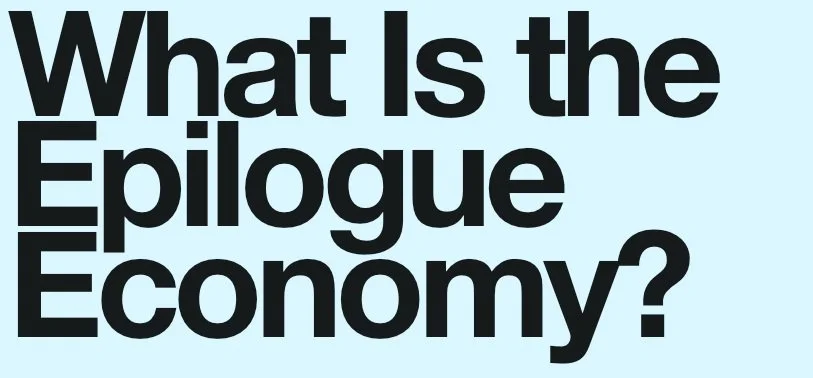
I believe it is a new lens
on value, relevance, and reinvention.
We live in a world obsessed with the new. New tech. New ideas. New generations. But what about the people who built the world the rest of us are rushing to reinvent?
The Epilogue Economy™ is a term I first used in April of 2024, as I began thinking about one of the most influential and often overlooked demographics in today's market - the aging consumer.
I began paying attention to the immense power and potential of this group, because I am one of them, one of the massive, growing, and wildly underestimated economic and cultural force made up of people in their 50s, 60s, 70s, and beyond, not slowing down, not checking out, but stepping into new roles, new ambition, and new relevance.
We, and I mean those over 50ish, are living longer, working longer, and seeking out second or third journeys and alternative types of careers later in life. We have the means and the motivation to invest in products and services that align with our values and enhance our quality of life. And let's not forget our growing concern for the environment and the legacy that we will eventually leave behind.
The Epilogue
I started thinking about the construct of the Epilogue. One formal definition of epilogue is: "a concluding section that rounds out the design of a literary work”. But an epilogue also serves other purposes:
It offers a reflection on the themes, characters, or events of the story.
It can provide a glimpse into the future, showing how the characters' lives have changed since the main story ended.
In some cases, it may even set the stage for a sequel or continuation of the story.
It was idea #3 that really caught my attention.
The Aging Consumer
We are a force to be reckoned with, as we write our own epilogues, and then begin our next adventure. By tailoring products, services, and marketing strategies to this demographic, companies can tap into a well of potential that has been largely ignored.
It's not about age; it's about understanding the unique needs, desires, and aspirations of this influential group. But there is also so much potential in bringing that experience to bear on the operational, or maybe strategic side of business as well.
For the first time, Age is a Growth Market.
By 2050, adults aged 50+ in the U.S. will command $28 trillion in spending power. The European Union defines the “Silver Economy” as encompassing all economic activities catering to the needs of people aged 50 and over. In 2020, the EU 50+ demographic accounted for 50% of global consumption, with projections indicating this will rise to 59% by 2050.
Individuals aged 50 and older are expected to account for 60% of consumer spending in 60 of the core 76 economies worldwide.
Older consumers are already the core customers in economies like Japan and South Korea, and they are not the “aging” exception. Globally, premium travel, adaptive fashion, luxury wellness, and tech-for-longevity are growth sectors.
Many older adults still support aging parents and younger kids, which some call the “triple-decker sandwich generation.” Financial services, insurance, healthcare, and education must adapt to meet this layered reality.
The Epilogue Economy isn’t a stage of life. It’s a shift in mindset. It reframes retirement as reinvention, transforms passive consumers into active co-creators, and replaces outdated notions of aging with a renewed sense of agency. It’s not about winding down; it’s about showing up differently with perspective, spending power, and influence.
That’s not a silver economy, that’s a sovereign one. Yet this demographic receives just 5–10% of marketing attention. It’s a staggering mismatch between cultural relevance and commercial recognition.
The future isn’t just young. It’s long.
And the most valuable audience in the world? They’re not waiting to be discovered. They’re already here. Living longer. Spending smarter. Leading differently. And rewriting the rules of work, wealth, wellness, and worth. This is not a niche. This is not a trend.
This is the Epilogue Economy™.

